





'I do not believe that the churches will continue to exist in their present form.
'National Socialism represents a world-idea that will be accepted by all peoples.'
James Battersby continued on this truth:
'The working class positively benefited from Hitler's rule, under which the standard of living was raised till it became the highest in Europe.'
The great British political soldier and writer Colin Jordan wrote:
'Hitler was right in believing in extensive social welfare for all members of the folk community. The NSDAP's "Strength through Joy" organization had by 1938 enabled over 22 million to visit theaters, over 18 million to attend film performances, over 6 million to attend concerts, over 3 million to attend factory exhibitions, and no less than 50 million to take part in cultural events. The organization had 230 establishments for popular education, and through it 62,000 educational events were arranged, being attended by 10 million people. By 1938, 490,000 had been given sea cruises, and 19 million had been given land excursions. 21 million had taken part in sporting events. All this at a time when the democracies left millions of unemployed to rot, and those who were employed received nothing remotely comparable to such welfare. The best-selling car in history—more than 15 million of the Volkswagen "Beetle" in over 30 countries—resulted from Hitler's project of a people's car, a small inexpensive car for the ordinary man. Connected with this, his Autobahn construction-program preceded Britain's by decades.'
[Above: Colin Jordan (June 19, 1923 – April 9, 2009) at the platform of the NSM (National Socialist Movement) Trafalgar Square rally, July 1, 1962.]
I wonder if the American soldiers who thought they were fighting for good would recognize America today? They would be horrified. Everything Germany and Adolf Hitler warned them about came to be. The truths of National Socialism are striking and very real. As relevant today as they were yesterday, but more so. We're in the age they dreaded. The hydra of their nightmares now has a million heads. Their human cattle are slaughtered for slogans. A horrible mass of mindless and medicated humanity that believes all their tyrants tell them.
And to the enemies of earth:
Eternally, the world whispers, Heil Hitler!
[Above: Wang Jingwei]
[Above: Wang Jingwei, 1930.]
[Above: Wang Jingwei receiving German diplomats while head of state in 1941.]
He served in various governments during the turbulent 1920s and 1930s. China was splitting into pieces, torn apart by communism and various factions in-fighting.
Jingwei had constant disputes with nationalist leader Chiang Kai-Shek. For years the two of them struggled for power. Eventually Jingwei was forced into exile to Germany. During his exile in the mid-1930s he is known to have some contact with Adolf Hitler, although it is relatively unknown the level of their relationship.
In December 1935, back in China, Jingwei permanently left the premiership after being severely wounded from an assassination attempt a month earlier.
[Above: Wang Jingwei, Hideki Tojo and Subhas Chandra Bose in Tokyo, 1943.]
Jingwei was pessimistic about the war with Japan. He believed that China needed to reach a negotiated settlement with Japan so that Asia could resist Western Powers.
[Above: Asian heads of state who attended the Greater East Asia Conference in Tokyo. Left to right : Ba Maw, Zhang Jinghui, Wang Jingwei, Hideki Tojo, Wan Waithayakon, José P. Laurel, Subhas Chandra Bose.]
[Above: Wang Jingwei on the cover of Time Magazine, March 18, 1935.]
Jingwei's 'Government of National Salvation of the Republic of China', was born on the Three Principles of Pan-Asianism, anti-communism, and opposition to Chiang Kai-shek. Wang continued his contacts with German National Socialists and Italian Fascists, which he had established while in exile, throughout the next years until his death.
[Above: Wang Jingwei in battle dress, 1940s.]
Jingwei Wang was buried in Nanjing in a marvelous tomb. Shortly after Japan's defeat, the Chinese government under Chiang Kai-shek moved its capital back to Nanjing and destroyed Wang's tomb, vengefully burning his remains.
Most of Jingwei's senior government were executed at the end of the war for treason.
[Above: Chinese soldier of the Japanese-sponsored Nanjing government with a ZB vz. 26 light machine gun. Up to 800,000 Chinese joined the Japanese in their fight against communism. 800,000!]
[Above: Machine gun toting Chinese volunteers to the Japanese army serving as security troops in Japanese occupied Shanghai, December 1941.]
The reality was that the war in China was supremely bloody and violent as hell. All the forces involved were guilty of savagery at times. Such is war. But like the old saying goes:
While the Japanese and Chinese weren't butchering one another there was also mercy and a gentle humanity.
[Above: Japanese soldiers give water to a Chinese baby.]
[Above: A Japanese Army soldier gives a dying horse a drink of water from his canteen during the opening stages of the Battle of Shanghai.]
[Above: Japanese soldiers with civilians in Canton City, 1940.]
[Above: Chinese volunteer lighting the cigarettes of two Japanese soldiers.]
[Above: Chinese children playing in a Japanese army sidecar. One of the children holds the stock to a type 11 light machine gun. Shanghai, 1937.]
[Above: Two nuns bandage the head of a wounded Chinese prisoner while a Japanese soldier looks on.]
There you have it. Those strange moments of humanity in hell.
[Above: Note the patch on this Arab volunteer's arm]
[Above: Men of the KODAT, bayonets at the ready. They are serving with the Luftwaffe. Note their sleeve patches are the same as the one above.]
[Above: The KODAT seen above on the march.]
[Above: Grenades being handed out, somewhere in Greece.]
[Above: Unfortunately we can only see a tease of the unit flag he's holding.]
[Above: Men of Sonderverband 287 preparing an operation.]
[Above: Prince Louis II (July 12, 1870 – May 9, 1949)]
[Above: Postage stamp from 1941]
Italian troops however marched straight through Monaco and occupied it after declaring war on France in June 1940, though this occupation was only temporary and once again Monaco was left alone.
[Above: A youth from Monaco applies stickers in support of Adolf Hitler and Mussolini to a bookstore window. November 1942.]
The Prince also engaged in many money dealings with Germany and Italy. He was said to have sold German shares to Germany at highly overvalued prices. Obviously the Germans wanted to keep the Prince as an ally.
[Above: A painting of Prince Louis II]
[Above: Princess Antoinette (December 28, 1920 – March 18, 2011)]
After the Germans left Monaco communists took advantage of the resulting chaos and became a part of the 'liberation' government.
To this day many of the files regarding Prince Louis' alliances with Germany are sealed by Monaco. They, like many other governments around the world, are afraid of the truth. The truth being many nations saw Germany and the Axis as a liberating force and happily worked with them. Countless files are still sealed around the world. Freedom. Democracy. Secrets. Secrets. Secrets. Secrets the common man isn't trusted to know. Secrets that would harm the Judeo-capitalist story of WWII. Secrets that would show that the real good guys lost WWII. Under the system which prevailed after WWII we've all been made into a herd of human animals which work their lives away yet don't get any richer. A herd of sleeping cattle who endlessly are in debt to usurious and predatory banks. Those age-old vampire-like tyrants will do anything to keep their piles of gold and power. They've been blowing up the world for centuries and have no plans on stopping. All to keep a tiny, tiny minority insanely rich. Ridiculous that people don't rise up and end this madness once and for all. That's what they did in Germany with Adolf Hitler. They ended usury and predatory practices against the people. It's time the world takes this example and sends these false kings and their collaborators to hell.
[Above: Meinoud Rost van Tonningen]
Rost van Tonningen was born in the Dutch East Indies on the island of Surabaya (now Indonesia). He went to the University of Leiden after high school to study law.
He later (1923-1928 and 1931-1936) went on to work as a representative of the League of Nations in Vienna, and it was there that he began to see the utter corruption of the financial world. His job was to monitor the Austrian financial policy. He realized that a huge portion of the world's wealth was in a tiny minority of the world's population and it consisted mainly of people of Jewish origin. He also saw the threat that communism was to the world and he began his life-long battle against it.
Rost van Tonningen returned to the Netherlands in 1936 and became a member of the NSB. That same year he won a seat in Parliament and was the leader of his parliamentary party. He saw the beauty of National Socialist Germany and saw it as an ideal and model for the Netherlands to follow.
He became the editor-in-chief for the NSB party newspaper Het Nationale Dagblad and was able to share with his fellow NSB members the light that National Socialist Germany was to the world.
In 1939 Rost van Tonningen built a paramilitary organization called the Mussert Guards (named for the leader of the NSB Anton Mussert). Admirably, many of the members of the Mussert Guards later went on to join the Nederlandsche SS.
When Germany occupied the Netherlands, Arthur Seyss-Inquart tasked Rost van Tonningen with the job of removing the dangerous communist organizations from the country. He also was appointed as Secretary-General of the Finance ministry and President of the Dutch National Bank.
Rost van Tonningen trained to be an officer in the first battalion in a Dutch paramilitary defense organization called Landstorm Nederland in the summer of 1944. In March of 1945 he joined the other brave men fighting for the very soul of Europe at the frontlines, which ran right through the Netherlands.
Alas, he was taken prisoner by Canadian troops on May 8, 1945. He was only in the prison camps of the Allies for less than a month when he supposedly committed suicide by jumping from a balcony.
He left behind the love of his life, Florentine Rost van Tonningen, who was convinced that her husband was tortured and murdered by the democratic 'liberators' and valiant defenders of usury. She had good reason to believe this, the quote below illustrates the dark and terrible crime.
'I never received official notice of my husband's death, which authorities later claimed was a suicide. They have never produced any evidence to support this claim: the records pertaining to my husband have been sealed until the year 2069.
I was presented, however, with a bill from the municipal sanitation service of The Hague, for on June 6, 1945, the day of my husband's death, his remains were transferred, first from the prison to a hospital and then to a cemetery, in a garbage truck.'
[Above: Meinoud and his beautiful and loyal bride Florentine on their wedding day. Heinrich Himmler was the best man and Adolf Hitler is said to have kissed the wedding ring!]
In the decades following Meinoud's death his widow Florentine fought for the truth ceaselessly. She kept her husband and soul mate's name alive by writing many books and giving speeches. She was a warrior for National Socialism until her death in 2007.
[Above: Wim Heubel ]
[Above: Wim Heubel on the day of his marriage to Ans van de Berge, August 9, 1943.]
[Above: Men of The Light Transport Brigade]
This incredible unit was attached to the 8th Italian Army, which in turn was subordinate to German Army Group B. These men were a remarkable symbol of brotherhood and cooperation.
The unit was first formed by an Italian request in July 1941. The unit was assembled and moved to
Italy in December, where it underwent training. Upon completion of their training the unit was visited by Croatian field marshal Slavko Kvaternik. By April 1942 it reached the frozen wasteland of the Eastern Front.
[Above: Slavko Kvaternik (August 25, 1878 – June 7, 1947) was the 1st Minister of Armed Forces of the Independent State of Croatia and was one of the founders of the Ustaša movement.]
[Above: On April 10, 1941 Slavko declared the creation of the Independent State of Croatia.]
[Above: An SPA 38 R light truck -- somewhere on the Eastern Front.]
[Above: Stamps issued to honor the fallen heroes of The Legione Croata Autotrasportabile. The surcharge went to the families of the fallen soldiers.
[Above: Hekmet Fahmy]
Hekmet was a well-known Egyptian nationalist, and as such, she naturally hated the British, who controlled Egypt at the time. In the early 1940s she met up with former boyfriend Johann Eppler. Eppler was the head of German intelligence (Abwehr) in Cairo. Although he was German he grew up in the port city Alexandria. His contacts were vast and included friendships with King Fuad and Prince Kemal of Egypt.
[Above: Hekmet Fahmy.]
Sometime in 1942 the British arrested Hekmet and sentenced her to five years in prison. This ruined her career, by the time she was released from their dungeons she was forty years old. The young, dashing cabaret dancer was gone forever. She had been replaced by young girls who were already basking in the fame she once enjoyed.
Hekmet starred in several movies, but they never went very far. Her days as a celebrity were over and she soon faded into legend. A great patriot who fought on the side of light against the enemy of mankind. For that, Hekmet Fahmy, you forever earned the lasting fame, love and admiration that you so desired in life.
[Above: Hekmet Fahmy.]
[Above: Postwar movie poster. Hekmet Fahmy starred in six movies from 1939 to 1947.]
[Above: 1939 postcard from Luxembourg showing a German National Socialist flag, among others.]
[Above: 1940 Luxembourg postage stamp with German overprint.]
[Above: Luxembourg revenue stamp. Click to see documents.]
Another organization of interest was the Luxemburger Gesellschaft für deutsche Literatur und Kunst (GEDELIT - 'Society for German Literature and Art'). The GEDELIT was founded in 1934 and was later led by high school teacher Damian Kratzenberg (November 5, 1878 – October 11, 1946), who taught Greek and German.
[Above: Damian Kratzenberg]
[Above: Membership card for the Volksdeutsche Bewegung, issued in 1940.]
[Above: Volksdeutsche Bewegung pin.]
[Above: Volksdeutsche Bewegung poster. It says:
[Above: Damian Kratzenberg]
[Above: Young men from the youth faction of the Volksdeutsche Bewegung, the 'Luxemburger Volksjugend'.]
[Above: The Goethe-Medaille für Kunst und Wissenschaft or The Goethe-Medal for Art and Science was authorized by Reichspresident Paul von Hindenburg to commemorate the centenary of Johann Wolfgang von Goethe's death on March 22, 1932.]
'Luxembourgers, hear the call of blood! It tells you that you are German by race and by language...'
By August of 1942 one third of the population was a member in the VdB!
[Above: A police officer from Luxembourg salutes Heinrich Himmler during his visit to Luxembourg in 1940. Courtesy of the Bundesarchiv.]
[Above: A Flakhelfen (Flak-helper) from Luxembourg manning anti-aircraft defenses during WWII.]
Due to the fact that Luxembourg was regarded as a part of the Reich there existed no Luxembourg Waffen-SS Legion. Therefore, unfortunately, there is no specific data and only vague information as to where most of these men served.
[Above: German postcard overprinted for use in Luxembourg.]
[Above: Envelope from Luxembourg dating from August 13, 1941. It is philatelic, having an odd mixture of stamps from different regions/countries. The stamps are: Germany, Luxembourg and the newly liberated territories of Elsaß (Alsace) and Lothringen (Lorraine). Note the phenomenal 'HITLER VICTORIOUS' red stamp!]
[Above: This tinnie, released in Luxembourg in 1942, says 'Erster Kreistag Luxemburg 1942' (First District Council of Luxembourg 1942).]
[Above: King Edward the VIII]
Edward was the next in line to become the king when his father died on January 20, 1936. Only a few months after being crowned as king Edward proposed marriage to an American woman named Wallis Simpson. She was a beautiful woman who had unfortunately been divorced once and was in the process of divorcing her second husband. This caused great controversy in England. As king, Edward was the head of the Church of England, and it didn't allow divorced people to remarry while their ex-spouses were still alive. King Edward the VIII was left with a decision to either marry the woman he loved and abdicate his position or to remain king of England. He chose to marry Wallis and stepped down as king after 326 days. It has been speculated that the real reason why he was pushed into abdicating was because he sympathized with National Socialist Germany.
[Above: Father Coughlin's newspaper Social Justice from March 1937 detailing King Edward being forced from the throne.]
An FBI report stated:
When King Edward stepped down and married Wallis he took the title of Duke of Windsor and Wallis became the Duchess of Windsor. The new couple took a trip to Germany and liked what they saw. Wallis was known to be friends with the German National Socialist Joachim von Ribbontrop. They happily met with Adolf Hitler at Berchtesgaden. The two men both understood what had happened to Europe and were eager to fight back the communist hordes threatening it. The Duke even used the National Socialist salute during his visit. Although the Duke was royalty, he had made waves in South Wales when he spoke out trying to help the unemployed coal miners. Adolf Hitler was a man of the people, of the worker. A leader like the Duke was exactly what the common man in Britain needed to be freed from the forces that kept them struggling and suffering to make ends meet. After the visit, it is said that Adolf Hitler said of the Duchess 'she would have made a good Queen.'
[Above: The Duke of Windsor's visit to National Socialist Germany.]
[Above: The Duke of Windsor's visit to National Socialist Germany.]
[Above: Adolf Hitler kissing the hand of the Duchess of Windsor.]
While in the Bahamas the Duke was determined to combat the poverty he saw on this British colony. He was praised by the natives for resolving wage disputes ending civil unrest on the islands. He reported that poverty and wage disputes causing so much trouble were caused by 'mischief makers-communists' and 'men of Central European Jewish descent who had secured jobs as a pretext for obtaining a deferment of draft.' In December of 1940 he was interviewed by an American journalist named Fulton Oursler. The Duke told Oursler that it would be tragic if Adolf Hitler was overthrown. He said that Hitler was not just the right and logical leader of the German people, but he was also a great man. He then asked Oursler, 'Do you suppose your President would consider intervening as a mediator when and if the proper time arrives?' Next he told Oursler, 'Tell Mr. Roosevelt that if he will make an offer of intervention for peace, that before anyone in England can oppose it, the Duke of Windsor will instantly issue a statement supporting it and that will start a revolution in England and force peace.' But of course the American President was one of the warmongers gladly accepting the blood on his hands of tens of millions, because without American involvement Germany surely would have been victorious. There was simply too much profit at stake for Mr. Roosevelt to consider a world without war.
On May 28, 1972 the duke died while at his home in Paris at age 77. His body was returned to Britain to be buried in the Royal Burial Ground.
[Above: Wallis Simpson (June 19, 1896 - April 24, 1986.]
Wallis, the Duchess of Windsor died April 24, 1986 at her home in Paris.
[Above: The British flag is prominently displayed during a gathering in Leipzig, 1930s. The German people never wanted war, and if the British people knew the truth that their government held back from them they wouldn't have either. Like the U.S.A., they were coerced and tricked into WWII.]
Below is a link to an article about other royal family members, including the future queen of England, showing their support of Germany and stiff arm saluting:
During WWII King Mohammed Zahir Shah 'officially' proclaimed the neutrality of Afghanistan. Although unofficially large numbers of German non-diplomatic personnel remained active in the country. The prying Allies knew of this and demanded Afghanistan expel all non-diplomatic personnel from the Axis nations.
The king and the government of Afghanistan were naturally insulted by this tyrannical demand. But the recent example of Iran was intimidating. Iran had been given a similar demand, denied it, was occupied and the king dethroned.
Seeing no other choice, they heeded the ridiculous order and expelled all citizens of Axis countries.
[Above: King Mohammed Zahir Shah.]
'The Afghan minister called on me on September 30 and conveyed greetings from his minister president, as well as their good wishes for a favorable outcome of the war. He inquired whether German aims in Asia coincided with Afghan hopes; he alluded to the oppression of Arab countries and referred to the 15 million Afghans who were forced to suffer on Indian territory.
'My statement that Germany's goal was the liberation of the peoples of the region referred to [those] who were under the British yoke... was received with satisfaction by the Afghan minister. He stated that justice for Afghanistan would be created only when the country's frontier had been extended to the Indus; this would also apply if India should secede from Britain... The Afghan remarked that Afghanistan had given proof of her loyal attitude by vigorously resisting English pressure to break off relations with Germany.'
Once again, a victory of National Socialist Germany and the Axis meant freedom for the world. The end of usury, imperialism, predatory capitalism and Judeo-capitalism.
[Above: A fascinating photograph showing the remnants of National Socialist German-Afghani cooperation during WWII. Those soldiers could almost be German! The picture shows commie Soviet boss Nikita Khrushchev (in black hat), and Marshal Nikolai Bulganin. They are reviewing an Afghan honor guard wearing old German uniforms, on their arrival in Kabul, Afghanistan, on December 15, 1955. At left is the Afghan Prime Minister Sardar Mohammed Daud Khan, and behind, in cap, the foreign minister, Prince Naim.]
[Above: Mohammed Zahir Shah's portrait on a 1939 1000 AFGHANIS note.]
'Liechtenstein for the Liechtensteiners!'
[Above: The first leader of the VDBL, Rudolf Schädler, in his workshop. Schädler was a composer and carpenter.]
[Above: The very first edition of the 'Der Umbruch' newspaper, October 1940. 'Kampfblatt der Volksdeutschen Bewegung in Liechtenstein' (Fighting Paper of the Ethnic German Movement in Liechtenstein). 'Umbruch und Neuordnung!' (Change and Reorganization!)]
[Above: Der Umbruch, July 5, 1941. 'Widerstandskraft der Sowjetarmeen gebrochen!' (Resistance of the Soviet Armies Broken!)]
[Above: Der Umbruch. 'An alle Mitglieder der Volksdeutschen Bewegung' (To all members of the Volksdeutsche Movement).]
In March 1939, the VDBL staged a failed coup which resulted in the immediate arrest of its leaders. The party was also banned from participating in the 1939 elections. The main parties actually worked together to keep the election date secret.
[Above: A National Socialist flag in Vaduz (the capital of Liechtenstein), circa 1938.]
[Above: Graffiti on the walls of a prison where political prisoners were held, 1933.]
[Above: Official stamp, circa 1937-1938]
The VDBL was wounded and temporarily laid low for a while and a period of inactivity followed. In June 1940 the party rose to life once more under the leadership of Dr. Alfons Goop (October 15, 1910 - September 25, 1993).
[Above: Dr. Alfons Goop]
In 1943 the VDBL began a recruitment drive for the Waffen-SS. How many volunteers stepped forward is unknown, but most of them were assigned to the 5th SS Panzer Division Wiking.
[Above: Crest of the Waffen-SS Wiking]
Perhaps the only sign of humanity the Liechtenstein government showed was when it gave asylum to approximately five hundred soldiers of the First Russian National Army (a volunteer force fighting with the German Wehrmacht) at the end of the war. This act saved these brave men's lives. The vast majority of their Russian brothers who also volunteered to fight communism were handed over to the Russian government to be slaughtered wholesale.
Eventually, Argentina resettled the Russian asylum seekers. Most of these courageous warriors would never see their beloved Mother Russia again.
[Above: Circa 1939]
[Above: The symbolic meanings behind Algeria's flag are as follows:
[Above: Envelopes from Vichy French Algeria, (left) postmarked in May 1941, sent to the Vatican. (right) This was sent to the Swiss Red Cross. It was postmarked on February 4, 1943 and has Allied censor tape.]
[Above: Close-up of Marshall Petain, the reluctant leader of Vichy France. A war hero of two world wars, the latter being unsung. For now.]
[Above: Mohamed Al-Ma'adi.]
Al-Ma'adi was born in Constantine in 1903 from a family of Arab-Berber old nobility, his father being Mahfouz Al-Ma'adi. In 1922, as a student, he was active in politics and wrote for the North African Star. In 1929, after residing in France for some time, he returned to Algeria, later to be arrested in 1933 for his political activities.
After spending some time in the French infantry and obtaining the rank of captain, he left the service in 1936. During these years he showed himself to be a capable soldier and officer, being a 'Knight of the Legion of Honor' and a holder of the 'Military Medal' and 'Croix de Guerre'. Despite all of this, he decided that he could not serve a power which enslaved so many through its colonial empire.
In the years that followed Al-Ma'adi rallied continually for Algerian Independence and held strong anti-Jewish views. He gained contacts with various political groups and joined the CSAR (Social Committee of Revolutionary Action). Later the CSAR attempted a coup, and Al-Ma'adi ended up in prison for a short time. In 1938, he launched the newspaper 'Algeria News', which was only active for a short time due to the outbreak of WWII.
Living in France during the German occupation of Northern France he joined the party of his friend Marcel Déat, the National Popular Rally. Soon after joining the National Popular Rally Al-Ma'adi organized the North African Committee and the Circle of North African Studies. During this same time he established strong contacts with Algerian independence circles in France.
[Above: 'L'Afrique du Nord - Terre D'histoire' (North Africa, Land of History) was published in July 1943 by Al-Ma'adi.]
'To tell the truth to many [people] is the ambition of this small work... [I am] a revolutionary soldier and I expected the fight; I defend the past and the future of my race...
Contrary to our critics, I do not harbor any vile sentiments. My [desire is] to make the truth known to men of good will and to try to get them out of the abyss where we have sunk because of evil and greed.
New Europe requires men and not serfs, it takes bravery, talent, brains and not cowardice and newspaper articles. Bravery we have... we will take the place vacated by our ancestors.
Following their example, we can produce all the treasures of the mind which disappeared with [them].
What do we want? [...] Our supreme ambition is to drive out, with native weapons in hand, the Anglo-Americans, Jews and all the traitors, whoever they are and whatever may be their situation. No mercy will soften the punishment, they punish us for imaginary crimes, they will be punished for real crimes[!]
...we are committed to hunt down the enemy of our homeland. We are also committed to occupy the spaces deserved by our talents. We have no ambition in any way to interfere in European affairs.
[But instead], here, in the land of our forefathers... we want all civic and civil rights. We want to have the opportunity to reach all administrative posts, including the highest.
In a word, we want to participate in the development of our own destiny.
That said, our future status should include:
[Above: 'Er-Rachid' (The Messenger), January 1943.]
Each issue of The Messenger contained an editorial by Al-Ma'adi on the first page. There he was able to discuss his views on the historical happenings around him.
[Above: 'Er-Rachid' (The Messenger), June 1943. This comic illustration shows an American and British soldier about to execute a North African.]
[Above: Mohamed el-Maadi after his arrest in November 1937. It says: 'Les trois Algériens arrêtés (de gauche à droite)' (The three Algerians arrested (from left to right). He was sentenced to 8 months in prison...]
Al-Ma'adi proceeded to recruit Arabs and Kabyles (The Kabyle people are a Berber ethnic group native to Kabylie in the north of Algeria). This North African Legion was planned to later be used as the core for an independent Algerian army, not only to liberate Algeria, but to establish an Algerian National Socialist state. A brigade was initially formed composed of three hundred Algerians. Officers and noncommissioned officers of the brigade wore an SS uniform. Enlisted men wore a uniform similar to that of the Militia, but with a belt and dagger of the Waffen-SS as a bonus. The brigade took part in battles against the French 'Resistance' in places like Corrèze, Dordogne and Franche-Comté.
Al-Ma'adi also helped recruit Algerians to work with the German intelligence services, as decribed below (note that it was the French, not the 'racist' Germans, who refused to recruit non-whites into their ranks):
'...the Milice was unwilling to enroll colored colonials into its racially self-aware ranks and did not do so until April 1944 and then only after considerable German pressure. The Germans were anxious to exploit anti-communist sentiment among Muslims, and already the S.D. in France had noticed how readily they were able to recruit Islamic Algerians (mainly from the Paris reigion). Indeed these characters came forward in such numbers that, in January 1944, the S.D. was able to set up a Brigade (also referred to as a Legion) Nord-Africaine. Recruiting was carried out on the Germans' behalf by the ultra-nationalist Algerian leader of the Parti du Progres Algerian, Mohamed al-Maadi. He succeeded in persuading some 400 of his compatriots to offer their services to the S.D....'
In August 1944, as the Allied armies were swarming over Europe in an orgy of destruction, Mohamed al-Ma'adi took refuge with his wife in Germany, where he was welcomed by the Grand Mufti Amin al-Husseini.
This noble dream ended in the miserable nightmare that was the end of the war and Allied victory.
After this hell and the death of our collective dream Al-Ma'adi's path led to Cairo, Egypt, where he died in 1954. He died with one great torment -- never being able to return home, to his ancestral land of Algeria. He passed away shortly before the uprising in Algeria which led to its independence. Such is life.
[Above: Mohamed Al-Ma'adi.]
[Above: Marcel Déat, 1932.]
[Above: This flag bears the runic symbol of the National Popular Rally (RNP).]
[Above: Poster of the JNP. It says: 'Heroic Times Require a Heroic Youth - Fight Alongside the JNP'. Poster by the Popular National Youth, the youth wing of the Popular National Rally (RNP). The poster was done by Roger Folk.]
[Above: Men of the National Popular Rally standing before a banner regarding a committee for worker relief.]
On March 16, 1944 Marcel Déat became 'Minister of Labor and National Solidarity' in Pierre Laval's government in Vichy.
[Above: Marcel Déat (middle) attending a National Popular Rally event.]
[Above: RNP members Jean Fontenoy, Eugène Deloncle, Marcel Déat, Jean Goy and Jean Van Ormelingen, 1941.]
[Above: Poster of the RNP.]
[Above: Poster of the RNP.]
[Above: Poster of the RNP. 'Adhérez!' (Join!)]
Déat however had fled to Italy in April of 1945 and assumed a new name, temporarily taking up a teaching position in Milan and Turin. He was later taken in and hidden by a religious order in the convent of San Vito, near Turin. It was here that he wrote his memoirs and lived outside of their dark grasp until his death in January 1955.
[Above: Marcel Déat.]
[Above: Georges Suarez.]
Suarez carries the honor of being the first martyr to be killed for journalism by the Judeo-murderers after the war. He was the first of many journalists sentenced to death during the Épuration légale ('legal purge'). The Épuration légale was a grotesque wave of vengeance after the war. Approximately 120,000 persons were sentenced! Between 1944 and 1951, official courts in France sentenced 6,763 to death. Many men, like Suarez, were murdered simply for their views or being writers or journalists who dared to resist the Judeo-world-empire.
Suarez was sentenced to death in 1944 and was murdered by the Allies on the 9th of November.
[Above: Louis-Ferdinand Céline.]
Céline joined the French military in 1912, eventually reaching the rank of Sergeant. During the beginning of WWI his unit was called into action. On the fateful day of October 25, 1914 he volunteered to deliver a message that others were afraid to do because of heavy German artillery fire. During this mission he was badly wounded in his arm and received the médaille militaire for bravery in November, and even appeared a year later in the weekly publication l'Illustré National.
In September 1915 he was discharged because of the severity of his arm wound, being declared unfit for military duty. He returned back to France and eventually secured various jobs, even traveling to Africa. Working for the Rockefeller Foundation he traveled to Brittany teaching people how to fight tuberculosis and improve hygiene.
After studying medicine for several years, in 1924 Céline took up the post of intern at a Paris maternity hospital. Thereafter he worked for the League of Nations, which took him to such far away places as Switzerland, the Cameroons, England, Canada, the United States, and Cuba. In America he saw the effects of capitalism and the assembly line, which disgusted him, describing it as a sensory attack and feeling that the workers were little more than part of a machine.
In 1928, Céline returned to France to establish a private practice in Montmartre, in the north of Paris, specializing in obstetrics. However, he would end this practice just three years later in 1931 to work in a public dispensary (a dispensary gives advice and medicines free-of-charge, or for a small charge).
[Above: Journey to the End of the Night.]
In 1936 Céline visited Russia and what he saw changed his life and his way of thinking. He saw communism with his own eyes and it shocked him. He said ''In Russia, the kikes, as soon as they assumed command, didn’t exactly wear mittens when they decimated the Aryan.''
Two years later Céline began a series of pamphlets (although they are referred to as pamphlets they are books with hundreds of pages!) with an anti-Jewish message: Trifles for a Massacre (Bagatelles pour un massacre, 1937), The School of Corpses (L'École des cadavres, 1938) and The Fine Mess (Les Beaux draps, 1941). The latter was published during the German occupation of France. To this day the reprint of these writings is very restricted, with extremely limited reprints that are filled with footnotes of Jewish hate for Céline. That is indeed how much they fear these books. Even the Israeli ambassador to France pressured the French government to block their publication. They have never been officially translated to English, although unofficial versions exist.
At the time of their writing they were huge bestsellers!
In fact, Trifles for a Massacre sold 75,000 copies during the war, and The Fine Mess sold 136,000. These books consumed huge amounts of rationed paper. It is very telling that 25% of the rationed paper allocated to his publisher went directly to Céline’s books!
In The School of Corpses Céline compared the greatness of Adolf Hitler with French communist party boss Maurice Thorez, writing:
'Who is the true friend of the people? Fascism is. Who has done the most for the working man?
[Above: A modern reprint (unlicensed) of Trifles for a Massacre.]
Here is a quote about Trifles for a Massacre by the great Robert Brasillach, who was murdered after WWII by the petty and vengeful Allies for his words!
'We do not want any violence. But when one has a Jewish Prime Minister, when one sees, clearly and simply, France dominated by the Jews, it also should be understood how this violence is prepared, and what explains it. I do not even say what legitimates it, I say what explains it. Have any opinion you want. On the Jews and on Céline... But I am telling you: this enormous book, this splendid book, is the first sign of the "revolt of the natives." Perhaps this revolt is excessive, more instinctive than reasonable: after all, the natives are us...'
Trifles for a Massacre is a bitter indictment of the Jewish overlords destroying this world. Céline had had enough. His anger and disgust dripped from his pen. His typewriter was a machine gun firing out truth. It is also one of the most feared and despised works of the 20th century. That should tell you a lot: that you should read it!
[Above: An illustration from the cover of a French edition of Journey to the End of the Night.]
After Germany and the Axis invaded the Soviet Union in June of 1941 Céline publicly supported the Legion of French Volunteers Against Bolshevism (LVF), saying:
'We do not think enough about the protection of the white Aryan race.
After Germany's defeat and the Judeo-world-victory, Céline fled to Denmark in 1945. He was charged as a 'collaborator' and was convicted in absentia in 1950, sentenced to one year of imprisonment and declared a 'national disgrace'.
Although he later returned to France and was granted amnesty his enemies had ruined his reputation. But firm in his beliefs, he never voiced regret for anything he had written or said about the Jews. In fact, he became a vocal 'holocaust denier', further offending his enemies by truthfully declaring that 'white Aryan Christian civilization' had ended with Stalingrad and that early in his life he had recognized the Jews as 'exploiters.'
Céline died on July 1, 1961 of a ruptured aneurysm, the day after finishing his last novel 'Rigadoon'.
[Above: Celine's trilogy of his escape from Vichy France during and after WWII: Castle to Castle (©1957, reprinted in 2011, Dalkey Archive Press), North (©1960, reprinted in 1996, Dalkey Archive Press), Rigadoon (©1969 published posthumously, reprinted in 1997, Dalkey Archive Press). Click to see the books in detail.]
[Above: An identification photo of Louis-Ferdinand Céline.]
'You always have to be wary of Jews, even when they’re dead.'
[Above: Artemio Ricarte y García.]
In August 1896 he joined the Filipino uprising against the Spanish and became a member of the Katipunan (The Katipunan was a Philippine revolutionary society founded by anti-Spanish Filipinos in Manila in 1892, whose primary aim was to gain independence from Spain through revolution.) During this uprising he killed the Spanish leader who was stationed in San Francisco de Malabon. For his ferocity and bravery in battle he was promoted to brigadier-general in Gen. Emilio Aguinaldo's army and became the captain general in the Tejeros Convention.
In 1899 war with the Unites States broke out and Ricarte was made the chief of operations of the Filipino forces in the second zone around Manila. The United States had been ceded the Philippines by Spain as a result of the latter's victory in the Spanish–American War. A compensation of 20 million US dollars was paid to Spain according to the terms of the 1898 Treaty of Paris. 20 million dollars for a country and countless lives. The first census conducted by the U.S. military forces was in 1903. They recorded 7,635,426 souls. That's 2.62 dollars for each person. Life is cheap eh?
America had no intention of recognizing the government the people of the Philippines had fought so hard to gain their independence for. America came bearing its full military might. The American's were notoriously brutal, with tens of thousands of Filipinos murdered in American scorched earth campaigns.
America demanded he sign an oath of allegiance to them. He adamantly refused. He would not bow down to the occupier of his country. In punishment America deported him to Guam in 1901. He was by now a symbol of resistance and the occupiers wanted him out of the picture. After being transferred to Hong Kong with other notable political exiles, he helped plan another revolution against the American occupiers and secretly returned to his homeland in December 1903. From there he met up with former members of the military and other freedom fighters and secretly traveled the country drumming up support.
[Above: Artemio Ricarte.]
This time he and his wife went to Yokohama, Japan. Ricarte opened a small restaurant, 'Karihan Luvimin', and returned to his first love of teaching. His book, 'Himagsikan nang manga Pilipino Laban sa Kastila' (The Revolution of Filipinos Against the Spaniards) was published in Yokohama in 1927.
While exiled in Japan WWII reared its terrible head. Japan believed Asians should be ruled by Asians and set out to free the Philippines from American occupation. Ricarte was now an old man, but wasn't going to miss his chance to return to the land he loved. He returned with the Japanese liberators to the Philippines. The Japanese drove the Americans out completely from the Philippine Islands. Tactically this was a stupendous victory. America lost important bases in the Pacific.
Ricarte understood the reality of the situation. Japan had no choice but to initially occupy the Philippines. Eventually, they promised, they would turn the reins back over to the people -- but for now, it was total war with imperialist America.
[Above: A modern Filipino postage stamp from 1984 featuring Artemio Ricarte.]
[Above: A modern commemorative Filipino envelope featuring the above stamp.]
Eventually America returned and re-occupied the Philippines. Ricarte fled from the vengeful Americans and their lackeys with the Japanese.
Japanese Colonel Ota asked Ricarte to evacuate the Philippine islands but Ricarte refused, stating: A true patriot. The chaos and hell of fleeing the Americans, of being constantly on the run, took its toll with the old fighter. He became ill with dysentery...
On July 31, 1945 at Hungduan, Ifugao, Ricarte died at the age of 78. His grave wasn't found until 1954 by treasure hunters. His bones were exhumed and placed in a tomb in Manila at the Heroes' Cemetery.
[Above: The General Ricarte National Shrine in Batac, Ilocos Norte, the hometown of Ricarte.]
[Above: Ricarte shrine in Batac Shrine in Yokohama, Japan.]
Page One
-|-
Page Two
-|-
Page Three
-|-
Page Four
-|-
Page Five
Page Six
-|- Page Seven
-|- Page Eight-|-
Page Ten
-|- Page Eleven
Page Twelve
-|-
Page Thirteen
-|- Page Fourteen
-|- Page Fifteen
Page Sixteen
-|- Page Seventeen
-|- Page Eighteen
-|- Page Nineteen
Page Twenty
-|- Page Twenty-One
-|- Page Twenty-two
-|-
Third Reich Photographs
-|-
In the future religion will be called National Socialism.
Its prophet, its pope, its Jesus Christ, will be called Adolf Hitler.'
-Alois Spaniol (September 19, 1904 - January 1959), in a January 1935 speech.
-James Battersby, The Holy Book of Adolf Hitler, 1952
'Each continent and nation will construct its own form of National Socialism...'
-Hugh Trevor-Roper
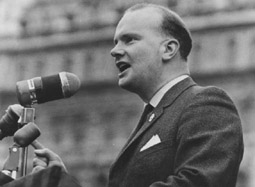
He was a living symbol. Realer than real.

You cannot stop us.
It is already too late.
His birth signaled your end.
The Age of Darkness is ending.
The first rays of a new tomorrow, free of you, are beginning to break.




'The victors decide who the war criminals are.'


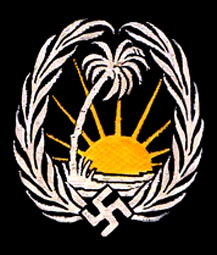




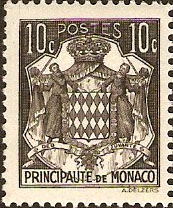


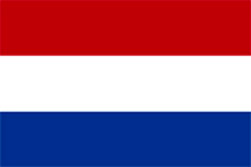

-Florentine Rost van Tonningen, the Ninth IHR Conference, February 18-20, 1989 in Huntington Beach, California.


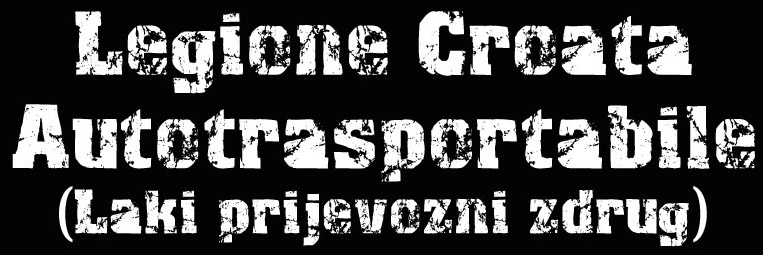
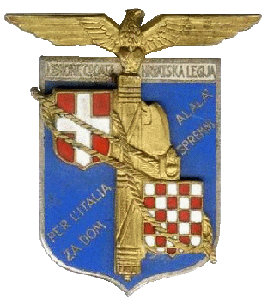

Note that the soldiers of this unit wore Italian helmets instead of the traditional German style.
Souvenir sheets were also issued. Click on the above image to see examples.]


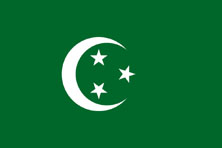

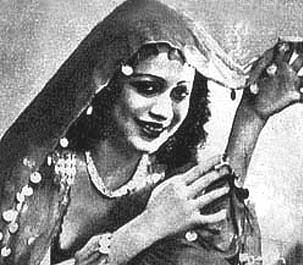
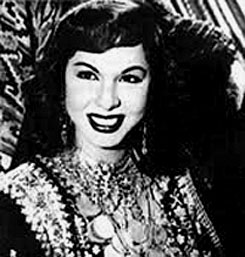




'Luxemburger du bist Deutsch -
Deine Muttersprache ist Deutsch -
Du gehörst zu uns! ' (Luxembourger, you are German - Your native language is German - You belong with us!)]
-A statement by the Volksdeutsche Bewegung (VdB) which aimed to reunite Luxembourg with the Reich.


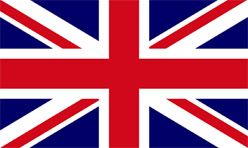

'The British were anxious to get rid of the Duke of Windsor [the title King Edward VIII took after stepping down], first and foremost because of his fondness for Nazi ideology.' There were powerful people in England and around the world that were hell bent on going to war with Germany. There were two main reasons for this; Germany had removed herself from the world financial market, abolishing usury, which made bankers unable to take advantage and profit from the work of the people. They wanted back in on this source of undeserved fortune. The second reason was that there were powerful war profiteers who were ready and waiting for a bloody war to fill their pockets.
'I am certain through him permanent friendly relations could have been achieved. If he had stayed, everything would have been different. His abdication was a severe loss for us.'
Joseph Goebbels wrote of him, 'It is a shame he is no longer king. With him we would have entered into an alliance.'







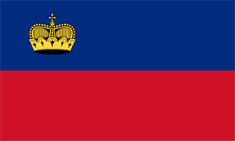
-Slogan of The German National Movement in Liechtenstein

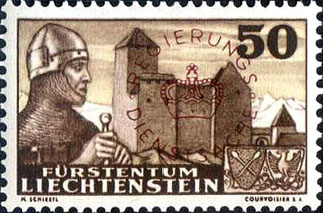

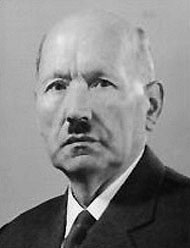
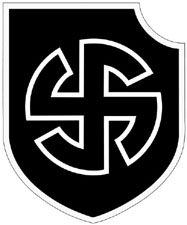
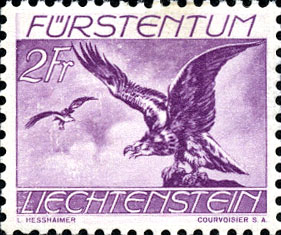



The white color represents peace and honesty;
the green stands for the beauty of nature, hope, and joy;
the red for the blood of those killed fighting for independence in the Algerian War (1954 to 1962).]


1. The Federation of North Africa and administrative autonomy.
2. The civic and civil equality of all people, except for the Jews.
3. The participation of Muslims in the administration of the country with the possibility of access to all the posts, including the highest, with no conditions other than those of talent and ability.
4. The creation of an autonomous army in which Muslims would get all ranks of the hierarchy.
5. The creation of an independent merchant navy.
6. The creation of trade corporations with absolute equality between corporations [...]
7. Industrialization and equipment in the country (rural housing, means of communication, electricity, construction of schools, hospitals, recordings sources, drilling wells, etc., etc.
8. Limited property right to the maximum of 500 hectares [Note: approximately 1,235 acres].
9. Expulsion of the Jews and traitors without any individual consideration. Confiscation of their property as well as trusts...'
'The Germans barely landed in Tunisia when an indigenous workforce was employed by their various services. This workforce had identical salaries to those of workers in the same category of France, Germany or Norway, while the other side, the "liberators", when they decided not to pay in funny money, offered from 10 to 18 francs for 12 hours of work... German soldiers and officers maintained the most correct and cordial relations with the natives. During a two-month stay in Tunisia, I [was able to record the experiences of the natives]. While in Tunis [under German control] public transport was free for everyone, [while] on the other side [the Allies] indigenous people [were forced to] travel in special wagons.'
'For over three years, France has had the occupation of its territory by a victorious opponent. Whatever can be argued by the alleged patriots, the occupation is very benign. It could be draconian, but National Socialist Germany and its leader, however, were the opposite, leaving its sovereignty and patrimony [intact].'
'I agree and advocate racism when it means selection and protection against miscegenation of a given breed in order to preserve its virtues. I condemn the racism disguised in democracies, under the cover of civilization...'
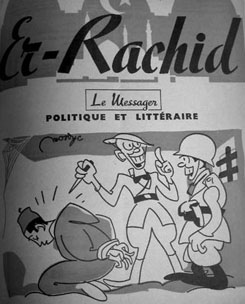
'...racism like all doctrines has its false prophets. It was for Gobineau a way to defend the breed. [It is] for some... an instrument of hatred against others... [but the goal of positive] racism is that the breed still retains the characteristics of its history, and its relation to human progress. It does not destroy, but it renders to each his part to increase and make better contributions to the needs of humanity. Racism does not imply hatred between races, but stimulates the effort of all. It does not catalog the species, but selects it. It [embraces] biological laws, and nature's logic too long scorned...'
'Our intellectual and racial affinities are closer to Europe. Our Muslim ideals, compared with the National Socialist ideals of the New Europe prove - identical. During a recent trip to Tunisia, we studied and observed the German-Muslim relations. At no time in our existence have we found between the two peoples, regardless of age or differing cultures, such a current of sympathy and understanding.'
'Our sympathy is always with National Socialist Germany who has always lavished its friendship on the oppressed Islam [which has been] shamelessly exploited by the democracies. Our commitment remains steadfast in revolutionary Europe, which will lift us with human dignity. Here, not only do we have wishes for a German victory, but we are determined to help them by all means, including weapons.'
'The victory of National Socialist Germany is the end of [the usury of one] people by another; it's the end of inequities, it is finally the light... [It is] the establishment in North Africa of a National Socialism that allows us to be born and to die with dignity...'
'At the foot of the destroyed minarets, Islam prays anxiously for the young soldiers who bathed themselves in the blood of virtue.'
--Foreign Legions of the Third Reich Vol. 1: Norway, Denmark, France, David Littlejohn, pg. 184


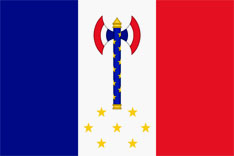

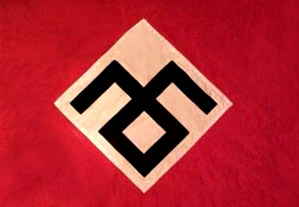


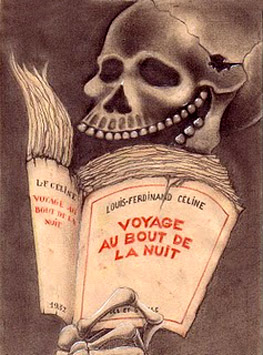
The USSR or Hitler? Hitler has... Who has done the most for the small businessman? Not Thorez but Hitler!'
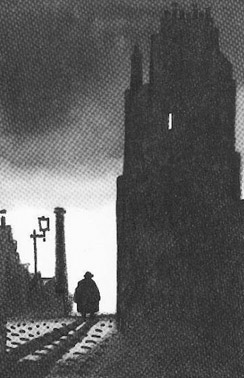
Now is the time to act, because tomorrow will be too late.
...Doriot behaved as he always has. This is a man ... one must work and campaign with.
...This Legion, so maligned, so criticized, is proof of life.
...I tell you, the Legion it's very good, it is all that is good.'
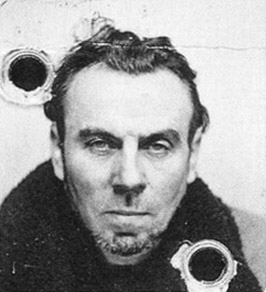
-Louis-Ferdinand Céline


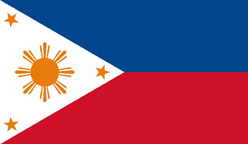

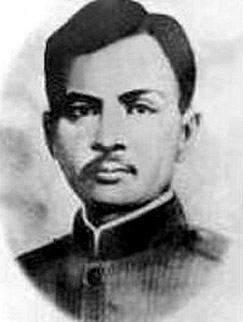
'I can not take refuge in Japan at this critical moment when my people are in actual distress. I will stay in my Motherland to the last.' 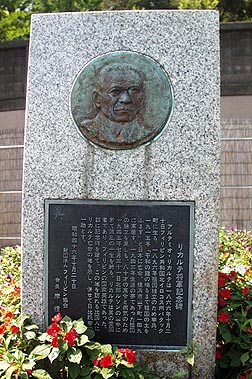


-|-
Third Reich Philatelia
-|-
-|-
Third Reich Ephemera
-|-
-|-
Third Reich Awards
-|-
-|-
Third Reich Miscellanea
-|-
-|-
Third Reich Identification Books
-|-
-|-
Third Reich Currency
-|-
-|-
The Great War
-|-
-|-
Hand of Pandora
-|-
-|-
Waffen-SS Technical Information -|-
-|-
The European Volunteer Movement in WWII -|-
-|-
Copyright -|-